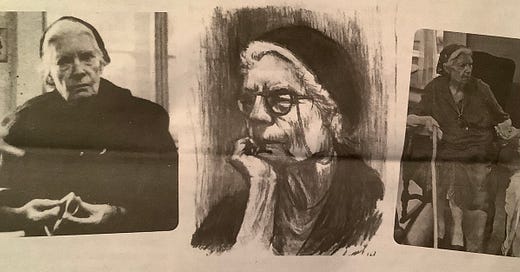The greatest challenge of the day is: how to bring about a revolution of the heart, a revolution which has to start with each one of us. - Dorothy Day
Servant of God Dorothy Day (1897-1980) was a writer, journalist, social activist, single mother, and co-founder (with Peter Maurin) of the Catholic Worker movement and Catholic Worker newspaper - and, perhaps soon, a Saint.
Day became a Catholic in 1927 after years of living what has been called a bohemian lifestyle. Her cause for canonization has been underway since 2000 and was recently advanced.
The canonization process began in 2000 at the request of New York’s Cardinal O’Connor. In 2012 the present Archbishop of New York, Cardinal Timothy Dolan raised the question of Day’s candidacy for sainthood at the annual meeting of the U. S. Catholic Bishops. The bishops voted to ask the Holy See to continue the canonization process.
“Unanimously they upheld sainthood for Day who related everything she undertook and did to the Sermon on the Mount. Few of the faithful in the twentieth century were more committed than Dorothy Day to the Church’s teachings on economic and social justice and on the evils of the arms race and the pursuit of war. She was a daily communicant, and rose early to read the Bible and pray the rosary.”1
Servant of God is the title given to a candidate for sainthood whose cause is still under investigation, prior to being declared Venerable.
Venerable is the title given to a candidate for sainthood whose cause has not yet reached the beatification stage but whose heroic virtue has been declared by the pope. Day’s cause was advanced in November to the stage of preparation of the positio - a comprehensive summary of all documentation; in this context, there are two: the one summarizing the investigation of a candidate's life and heroic virtues or offering of life, or martyrdom and a second for any alleged miracles. This phase entails much more research.
What comes next?
Once the positio has been accepted by the Dicastery for the Causes of Saints, the pope may declare Day “Venerable” - the next official stage in the canonization process.
The Houston Catholic Worker recently reported (Jan-Mar 2024 issue) that this stage often takes between two and five years. Once the positio has been officially submitted to the Dicastery, it undergoes examination by nine theologians who vote on whether or not Dorothy lived a heroic life. If the majority are in favor, the cause is passed on to cardinals and bishops who are members of the Dicastery. If these vote yes, the head of the Dicastery presents the results to the pope who can then give his approval and authorize the Dicastery to draft a decree declaring Dorothy “Venerable.”
More is required before the beatification of a Venerable. The entire process is outlined at the U. S. Bishop’s website here. The Dorothy Day Guild website is another resource for following the proceedings.
If you’re interested in learning more about her extraordinary life, I recommend Day’s autobiography The Long Loneliness. In 2015 I had the privilege of writing and presenting a paper at the Dorothy Day and the Church Conference held at the University of St. Francis in Fort Wayne. The paper, “Detachment as a Hallmark of Dorothy Day’s Spirituality,” is published along with others from the conference in Dorothy Day and the Church: Past, Present, and Future, and is available here.
Dorothy Day Guild.




